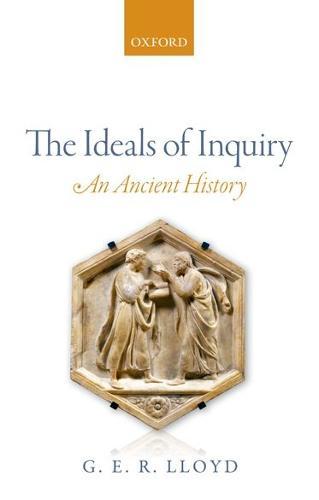Full Product Details
Author: G. E. R. Lloyd (University of Cambridge)
Publisher: Oxford University Press
Imprint: Oxford University Press
Dimensions:
Width: 14.20cm
, Height: 1.00cm
, Length: 21.50cm
Weight: 0.214kg
ISBN: 9780198776925
ISBN 10: 0198776926
Pages: 174
Publication Date: 30 June 2016
Audience:
College/higher education
,
Professional and scholarly
,
Undergraduate
,
Postgraduate, Research & Scholarly
Format: Paperback
Publisher's Status: Active
Availability: To order

Stock availability from the supplier is unknown. We will order it for you and ship this item to you once it is received by us.
Reviews
In all, this is an intensely satisfying read. Lloyd's clear prose and his impressive knowledge of the field makes one feel safe in taking for granted that each sentence merits reflection. And not least given the compactness of the text, the curious reader will be spurred on to other sources in order to unwrap further the significance of phenomena and relations described. The book is also a guided tour through several of the author's earlier well-known publications, and is accordingly brimming with references to a dozen other books and a handful of articles by Lloyd written in the course of the last half century. The book will thus to a certain extent function as a perspective on many of the more detailed investigations Lloyd has carried out during the last few decades; not the only possible perspective, certainly, but a central one. -- The Philosophical Quarterly
In all, this is an intensely satisfying read. Lloyd's clear prose and his impressive knowledge of the field makes one feel safe in taking for granted that each sentence merits reflection. And not least given the compactness of the text, the curious reader will be spurred on to other sources in order to unwrap further the significance of phenomena and relations described. The book is also a guided tour through several of the author's earlier well-known publications, and is accordingly brimming with references to a dozen other books and a handful of articles by Lloyd written in the course of the last half century. The book will thus to a certain extent function as a perspective on many of the more detailed investigations Lloyd has carried out during the last few decades; not the only possible perspective, certainly, but a central one. -- <em>The Philosophical Quarterly</em>
In all, this is an intensely satisfying read. Lloyd's clear prose and his impressive knowledge of the field makes one feel safe in taking for granted that each sentence merits reflection. And not least given the compactness of the text, the curious reader will be spurred on to other sources in order to unwrap further the significance of phenomena and relations described. The book is also a guided tour through several of the author's earlier well-known publications, and is accordingly brimming with references to a dozen other books and a handful of articles by Lloyd written in the course of the last half century. The book will thus to a certain extent function as a perspective on many of the more detailed investigations Lloyd has carried out during the last few decades; not the only possible perspective, certainly, but a central one. -- The Philosophical Quarterly
Author Information
G. E. R. Lloyd is Emeritus Professor of Ancient Philosophy and Science at the University of Cambridge. He is the author of nineteen books, including Being, Humanity, and Understanding (OUP, 2012), Cognitive Variations: Reflections on the Unity and Diversity of the Human Mind (OUP, 2007), and Disciplines in the Making: Cross-Cultural Perspectives on Elites, Learning, and Innovation (OUP, 2009). He became a Fellow of the British Academy in 1983, and received the Sarton medal in 1987. Lloyd was elected to an Honorary Fellowship at Kings in 1991, to Honorary Foreign Membership of the American Academy of Arts and Sciences in 1995, to the International Academy for the History of Science in 1997, to an Honorary Fellowship at Darwin in 2000, and to an Honorary D.Litt by the University of Athens in 2003. He was knighted for 'services to the history of thought' in 1997, and received the Kenyon Medal for Classical scholarship from the British Academy in 2007.




